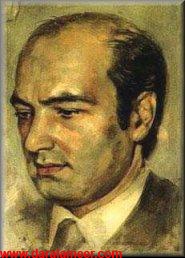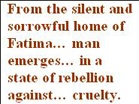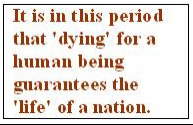Excerpts from Martyrdom
By: Ali Shariati
Below is the first of a selection of excerpts from the various works of Ali Shariati, whose works are currently being translated to Arabic and published in the Arabic language under the supervision of Dar Al Amir
There has been much written and said and much continues to be written and said about Imam Hussein and the role he played in history. The ancients have explained him one way and the innovating intellectuals in another. But as I realized recently, we cannot know what Imam Hussein has done without understanding what the meaning of martyrdom really is
The greatness of Hussein, on the one hand, and the individualistic views of him have caused that which is greater than Hussein himself to be concealed by the radiance of his charisma. That which is greater than Hussein is that which Hussein was sacrificed for. We have always spoken about Hussein but we have rarely spoken about the purpose for which Hussein so generously sacri¬ficed himself
In European and Western languages, a martyr is one who chooses 'death' in the defense of his beliefs against his enemy where the only way for him is to die. But the words, martyrdom: arise and bear witness, which exist in Islamic culture to express or name the one who has chosen 'death' has quite a different meaning from that of the western word, martyrdom. This shows one of the differences between Islamic and non-Islamic rites
In European countries, the word martyr stems from 'mortal' which means 'death' or 'to die'. One of the basic principles in Islam and in particular in Shiite culture, however is 'sacrifice and bear witness'. So instead of martrydom, i.e. death, it essentially means 'life', 'evi¬dence', 'testify', 'certify'. These words: martyrdom and bearing witness show the differences which exist between the vision of Shi'ite Islamic culture and the other cultures of the world
In the flow and struggle of history in the story of mankind, Hussein is the standard bearer of this struggle and his Karbala, a battlefield among battle¬fields, is the only link uniting the various fronts, the various generations and the various ages, throughout history from the beginning until the present moment and flowing on into the future
To view Hussein and the battle of Karbala as isolated from historical and social circumstances would force us, as indeed it has for many of us, to view the man and the event purely as an unfortunate, if not tragic occurrence in the past and some¬thing for us to merely cry about (and we certainly do continue to cry) rather than as an eternal and transcendent phenomenon. To separate Karbala and Hussein from their historical and ideological context is to dissect a living body, to remove only a part of it and to examine it in exclusion of the living system of the body
Suddenly a spark appears in the darkness and bursts through the silence, the radiant visage of 'a martyr who walks alive upon the earth.' From the depths of darkness, the immense corruptions and obscure nights of despair, the light and powerful feature of 'a hope' is seen
From the silent and sorrowful home of Fatima, the little house which is greater than the whole of history, a man emerges - angry, determined, in a state of rebellion against all of the palaces of cruelty and fronts of power. He is as a mountain which holds a volcano within it or as a hurricane like the one God sent to the tribe of 'Ad
[Zeinab], a woman has come out of Fatima's house with him, walking side by side with him. She bears half of the heavy mandate of her brother upon her shoulders
A man emerges from Fatima's house. Alone, friend¬less, with empty hands he confronts the terror the dark¬ness and the sword. He has only one weapon - death. But he is the son of the family who has learned the art of dying well in the school of life. There is no one in the whole world who knows 'how to die' better than he does. His powerful enemy who is ruling the world is deprived of this knowledge. It is because of this that this lonely hero is so confident of his victory over the immense army of his enemy and so determined. He confronts it without doubt
The great teacher of martyrdom has now arisen in order to teach those who consider the jihad to relate only to those who have ability and victory to be only in conquering. Martyrdom is not a loss, it is a choice, a choice, whereby the warrior sacrifices himself on the threshold of the temple of freedom and the altar of love and is victorious
Hussein, the heir of Adam, who gives life to the children of mankind, and the successor of the great pro¬phets, who taught mankind 'how to live,' has now come to teach mankind 'how to die
Hussein teaches that 'black death' is the miserable fate of a humbled people who accept scorn in order to remain alive. For death chooses those who are not brave enough to choose martyrdom. Death chooses them
The word shahid, martyr, contains the highest form of what I am saying. It means, being present, bearing witness, one who bears witness. It also means that which is sensible and perceptible, the one who all turn towards. Finally, it means, model, pattern, example
Martyrdom: To arise and bear witness in our culture and in our religion is not a bloody and accidental happen¬ing. In other religions and tribal histories, martyrdom is the sacrificing of the heroes who are killed in the battles of the enemy. It is considered to be a sorrowful accident full of misery. Those who are killed in this way are called martyrs and their death is called martyrdom
But in our culture, martyrdom is not a death which is imposed by an enemy upon our warriors. It is a death which is desired by our warrior, selected with all of the awareness, logic, reasoning, intelligence, understanding, consciousness and alertness that a human being has
Look at Hussein. He releases his life, leaves his town and arises in order to die 'because he has no other means for his struggle to condemn and disgrace his enemy. He selects this in order to render aside the deceiving curtains which cover the ugly _ faces of the ruling power. If he cannot defeat the enemy in this way, at least he can disgrace them. If he cannot conquer the ruling power, he can at least condemn it by injecting new blood and the belief of jihad into the dead bodies of this second genera¬tion of the Revolution revealed to the Prophet
He is an unarmed, powerless and lonely man. But he is still responsible for the jihad. He has no other means except to die, having himself selected a 'red death'. Being Hussein makes him responsible to perform the jihad against all that is corrupt and cruel. He has no other means at his disposal for his jihad but his own death. He takes it and leaves his home only to enter the place of execution
We see how well he carried this out with his accurate plans, reasoning, a glorious, accurate and well-planned departure, movement and migration. Stage by stage, he clears the way, explaining the aim which he is 'moving towards', with a unique selection of companions - men who had come to die with him - as well as all of the members of his family. These are all of the things that he possesses in this world and he leads them to be sacrificed at the altar of martyrdom
The fate of faith which is being destroyed, the fate of those people who are awaiting Islamic justice and freedom but have now been captured by an oppression and pressure worse than the period of ignorance, are now awaiting his action
He who has no arms and no means has come with all of his existence, his family, his dearest companions so that the martyrdom of himself and his whole family will bear witness to the fact that he carried out his responsibi¬lity at a time when truth was defenseless and unarmed. He bears witness that nothing more than this could be done
You have heard that at the battle of Ashura, on the tenth day of the month of Muharram, Imam Hussein takes the blood flowing from the throat of his child, Ali Asghar, in his hands and throws it up to the heavens saying, "Look! Accept this sacrifice from me. Be my witness, my God
It is in this period that 'dying' for a human being guarantees the 'life' of a nation. His martyrdom is a means whereby faith can remain. It bears witness to the fact that great crimes, deception, oppression and tyranny rule. It proves that truth is being denied. It reveals the existence of values which are destroyed and forgotten. It is a red protest against a black sovereignty. It is a shout of anger in the silence which has cut-off the tongues
The articles posted on this site represent the opinions of their authors. Dar Al Amir does not necessarily endorse them |



